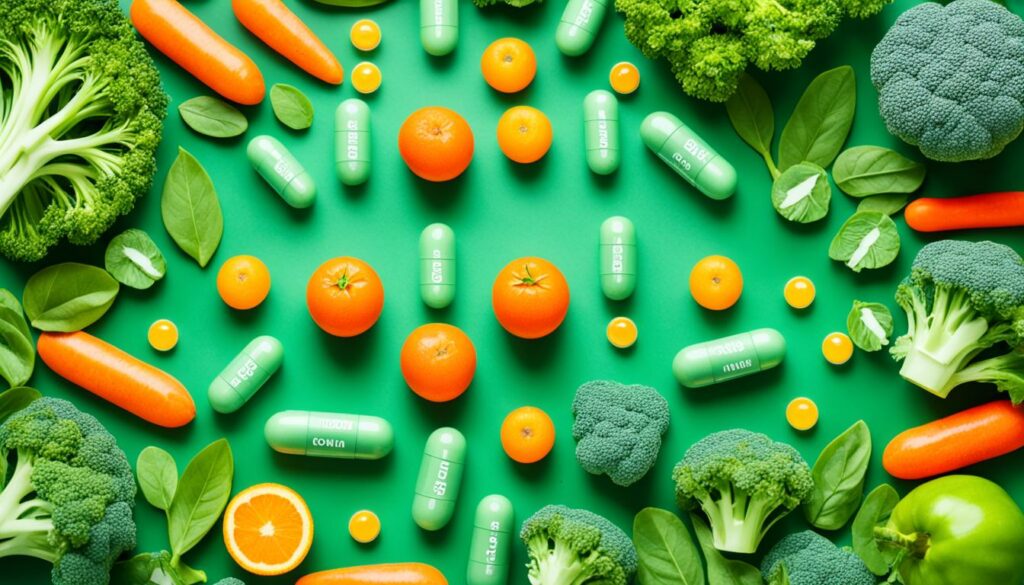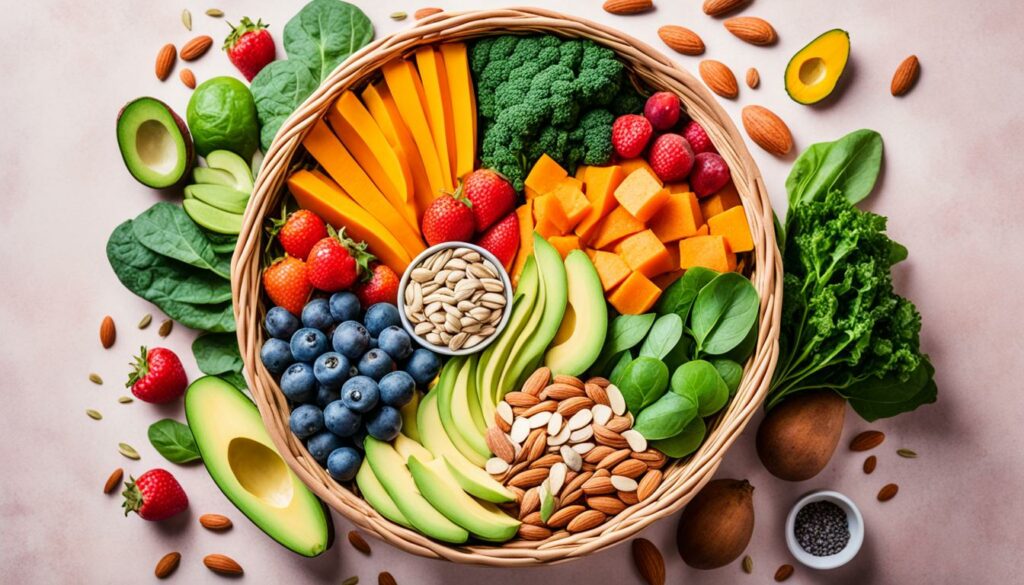Vitamin E is a powerful antioxidant that plays a crucial role in fertility and reproductive health. If you’re trying to conceive, understanding the benefits of vitamin E and the recommended dosage is essential for optimizing your chances of successful pregnancy.
Multiple studies have shown that vitamin E supplementation can improve ovulation, enhance sperm quality, and support the implantation of the fertilized egg in the uterine wall. However, the optimal dosage of vitamin E for fertility may vary based on individual factors such as age and overall health.
To ensure you’re on the right track, it is recommended to consult with a healthcare professional to determine the appropriate dosage of vitamin E for fertility optimization. They will take into consideration your specific needs and provide personalized guidance to help you achieve your goal of conception.
Key Takeaways:
- Vitamin E is crucial for fertility and reproductive health.
- Supplementation with vitamin E may improve ovulation, sperm quality, and implantation.
- The optimal dosage of vitamin E for fertility varies based on individual factors.
- Consult with a healthcare professional for personalized guidance on vitamin E dosage.
- Vitamin E is just one piece of the puzzle; incorporating other supplements and maintaining a healthy lifestyle is also important for fertility.
Understanding the Benefits of Vitamin E for Fertility
Vitamin E offers various benefits for fertility and reproductive health. It plays a crucial role in regulating hormone levels, improving blood circulation to the reproductive organs, and reducing oxidative stress. These effects contribute to a healthier, more conducive reproductive system.
In women, vitamin E supports healthy ovulation by aiding in the maturation and release of eggs. This process is essential for successful conception and pregnancy. By promoting ovulation, vitamin E increases the chances of fertilization and implantation of the egg.
For men, vitamin E is equally beneficial. It enhances sperm quality by protecting the DNA and membrane integrity of sperm cells. This protection ensures that the sperm cells are better equipped to fertilize an egg, leading to increased fertility.
Moreover, vitamin E plays a crucial role in the implantation process. It helps ensure that the fertilized egg remains attached to the uterine wall, improving the chances of a successful pregnancy. Adequate levels of vitamin E support implantation and enhance the overall reproductive process.
Recommended Dosage of Vitamin E for Fertility
The recommended dosage of vitamin E for fertility varies depending on individual factors. It is generally suggested to take a daily dosage of 200-400 mg of vitamin E for individuals under the age of 37. For individuals over the age of 37, the recommended dosage is typically increased to 400-600 mg per day. However, it is important to consult with a healthcare professional to determine the optimal dosage based on individual needs and health conditions.
Exceeding the recommended dosage of vitamin E for fertility may lead to potential adverse effects. It is essential to follow the guidance of a healthcare professional to ensure safe and effective supplementation.

Additionally, it is important to note that the dosage may vary depending on the specific vitamin E supplement being used. Different brands may have different concentrations, so it is essential to carefully read the product labels and follow the recommended dosage instructions provided by the manufacturer.
In conclusion, the recommended dosage of vitamin E for fertility is typically between 200-400 mg per day for individuals under 37 and 400-600 mg per day for individuals over 37. However, it is crucial to consult with a healthcare professional to determine the optimal dosage based on individual needs and health conditions. Remember to adhere to the recommended dosage to avoid any potential adverse effects.
| Age Group | Recommended Daily Dosage of Vitamin E |
|---|---|
| Under 37 | 200-400 mg |
| Over 37 | 400-600 mg |
Best Sources of Vitamin E for Fertility
Vitamin E is a crucial nutrient for fertility, and incorporating it into your diet can be beneficial for reproductive health. There are both natural food sources and supplements that can provide an adequate amount of vitamin E.
- Nuts and seeds: Almonds, sunflower seeds, and hazelnuts are excellent sources of vitamin E. They can be enjoyed as a snack or added to salads or smoothies.
- Vegetable oils: Wheat germ oil and sunflower oil are rich in vitamin E. These oils can be used in cooking or as a salad dressing.
- Leafy greens: Spinach is a vegetable with a high vitamin E content. Including spinach in your meals or smoothies can boost your intake of this essential nutrient.
- Cruciferous vegetables: Broccoli is another vitamin E-rich food that you can incorporate into your diet. It can be steamed, roasted, or added to stir-fries.
- Avocados: Avocados are not only delicious but also a great source of vitamin E. Enjoy them in salads, sandwiches, or as a healthy avocado toast.
In addition to these natural sources, vitamin E supplements are available in the form of capsules or tablets. When choosing a supplement, opt for high-quality products from reputable brands. It is essential to follow the recommended dosage provided by healthcare professionals to ensure safety and efficacy.

Image above: Visual representation of vitamin E-rich foods for fertility.
Other Supplements for Boosting Fertility
While vitamin E is beneficial for fertility, there are several other supplements that may also support reproductive health and enhance fertility. These additional fertility supplements can be taken in combination with vitamin E to further optimize fertility and increase the chances of successful conception. Some of the supplements that have been associated with improved fertility outcomes include:
- Vitamins B6 and B12: These vitamins play a crucial role in hormone regulation and can help support healthy ovulation and reproductive function.
- Vitamin C: As a powerful antioxidant, vitamin C helps reduce oxidative stress and supports the overall health of the reproductive system.
- Zinc: This essential mineral is vital for fertility as it helps in the production of healthy sperm and promotes hormonal balance in both men and women.
- Omega-3 fatty acids: Found in fish oil and flaxseed oil, omega-3 fatty acids have been linked to improved fertility outcomes by enhancing egg quality and reducing inflammation.
- Iron: Adequate iron levels are essential for fertility, as iron deficiency can lead to irregular menstrual cycles and reduced fertility in women.
- N-acetyl-cysteine (NAC): This amino acid compound has antioxidant properties and has been shown to improve ovulation and egg quality.
- L-arginine: This amino acid supports healthy blood flow to the reproductive organs and can help enhance fertility in both men and women.
- Acetyl L-carnitine: This compound plays a role in energy production and helps support the health and function of sperm cells.
These supplements, along with vitamin E, can be obtained from natural sources or taken in the form of high-quality supplements. To determine the most suitable supplements and dosages based on individual needs, it is recommended to consult with a healthcare professional or a naturopathic doctor specializing in fertility. They can provide personalized guidance and create a supplement plan tailored to your specific requirements.
A holistic approach to enhancing fertility involves not only supplements but also making lifestyle modifications, such as maintaining a healthy diet, managing stress levels, getting regular exercise, and avoiding smoking and excessive alcohol consumption. By combining these natural ways to enhance fertility with the right supplements, individuals can improve their reproductive health and increase their chances of conceiving.
Considerations and Precautions
While considering vitamin E supplementation for fertility, it is vital to take certain factors into account and exercise necessary precautions. Although vitamin E is generally safe for most individuals, some may experience allergic reactions or adverse effects when taking supplements. It is advisable to start with a lower dosage and gradually increase it under the guidance of a healthcare professional to assess tolerance and potential side effects.
If you are currently taking any prescribed medications, it is crucial to inform your healthcare provider before incorporating vitamin E supplements into your fertility regimen. Vitamin E can interact with certain medications, such as blood thinners or cholesterol-lowering drugs, which may affect their effectiveness or pose risks of bleeding complications.
Consulting with a healthcare professional before starting any new supplements, including vitamin E, is essential, especially if you have underlying health conditions or if you are pregnant or breastfeeding. They can provide personalized advice based on your medical history and help you determine if vitamin E supplementation is suitable for you.
Remember, vitamin E can be an excellent addition to your fertility journey, but it should be approached with caution and under professional guidance. By considering these precautionary measures, you can safely incorporate vitamin E into your fertility routine and optimize your chances of achieving the desired outcome.
Conclusion
Overall, vitamin E is a vital nutrient for promoting fertility and supporting reproductive health. Its antioxidant properties help protect cells from damage and optimize the function of the reproductive system. However, determining the optimal dosage of vitamin E for fertility may vary based on individual factors such as age and overall health.
Consulting with a healthcare professional is crucial to determine the most suitable dosage and supplementation plan for your specific needs. It is important to follow their guidance and not exceed the recommended dosage to avoid potential adverse effects.
Incorporating other fertility-enhancing supplements, such as vitamins B6 and B12, vitamin C, zinc, and omega-3 fatty acids, along with maintaining a healthy lifestyle, can complement the benefits of vitamin E and further support fertility. Taking a holistic approach to fertility optimization can increase the chances of successful conception.
https://girlslikecomics.com/vitamins-benefits-for-the-body/
FAQ
How much vitamin E should I take for fertility?
The recommended dosage of vitamin E for fertility varies depending on individual factors. Generally, it is suggested to take a daily dosage of 200-400 mg of vitamin E for individuals under the age of 37. For individuals over the age of 37, the recommended dosage is typically increased to 400-600 mg per day. However, it is essential to consult with a healthcare professional to determine the optimal dosage based on individual needs and health conditions.
What are the benefits of vitamin E for fertility?
Vitamin E offers numerous benefits for fertility and reproductive health. It helps regulate hormone levels, improve blood circulation to the reproductive organs, and reduce oxidative stress. Vitamin E promotes healthy ovulation in women and improves sperm quality in men. It also plays a vital role in the implantation process, ensuring that the fertilized egg remains attached to the uterine wall.
What are the best sources of vitamin E for fertility?
Some of the best natural sources of vitamin E include nuts and seeds (such as almonds, sunflower seeds, and hazelnuts), vegetable oils (such as wheat germ oil and sunflower oil), spinach, broccoli, and avocados. Incorporating these vitamin E-rich foods into your diet can help increase your intake of this essential nutrient. Additionally, vitamin E supplements in the form of capsules or tablets are available as a convenient option.
Are there other supplements that can boost fertility?
Yes, there are several other supplements that may support reproductive health and enhance fertility. Some of these include vitamins B6 and B12, vitamin C, zinc, omega-3 fatty acids, iron, N-acetyl-cysteine (NAC), L-arginine, and acetyl L-carnitine. These supplements have been associated with improved fertility outcomes and can be taken in conjunction with vitamin E to optimize fertility. Consult with a healthcare professional or a naturopathic doctor to determine the most suitable supplements and dosages based on individual needs.
Are there any considerations or precautions when taking vitamin E for fertility?
It is advisable to start with a lower dosage of vitamin E and gradually increase it under the guidance of a healthcare professional. Some individuals may experience allergic reactions or adverse effects from vitamin E supplementation. It is important to inform your healthcare provider about any medications you are taking, as vitamin E supplements may interact with certain medications. Consulting with a healthcare professional before starting any new supplements is crucial, especially if you have underlying health conditions or are pregnant or breastfeeding.
What is the conclusion on vitamin E for fertility?
Vitamin E plays a significant role in promoting fertility and supporting reproductive health. It is beneficial for both women and men, improving ovulation in women and enhancing sperm quality in men. However, the optimal dosage of vitamin E for fertility may vary, and it is important to seek guidance from a healthcare professional to determine the most suitable dosage and supplementation plan. Along with vitamin E, incorporating other fertility-enhancing supplements and maintaining a healthy lifestyle can further support fertility and increase the chances of successful conception.





